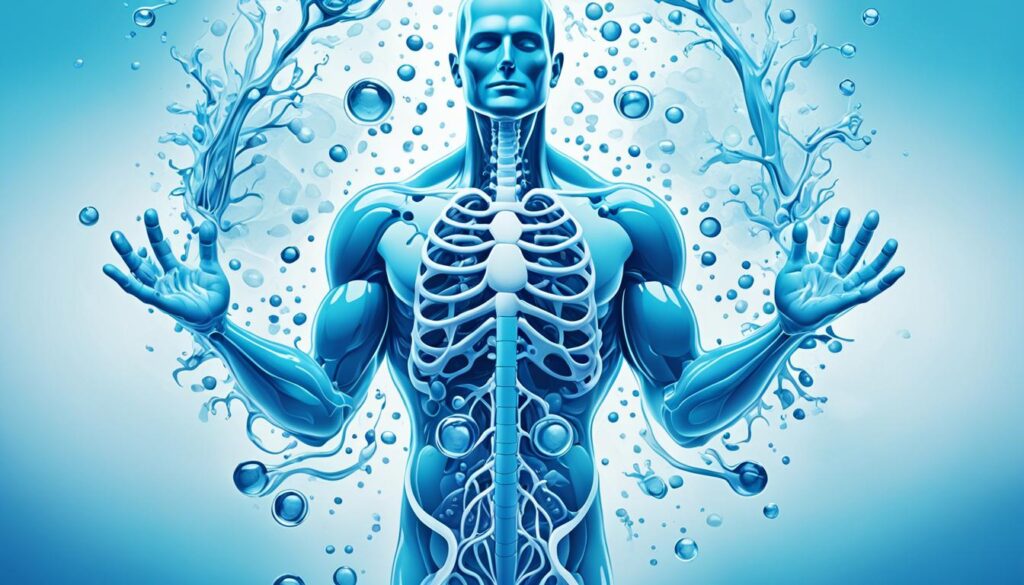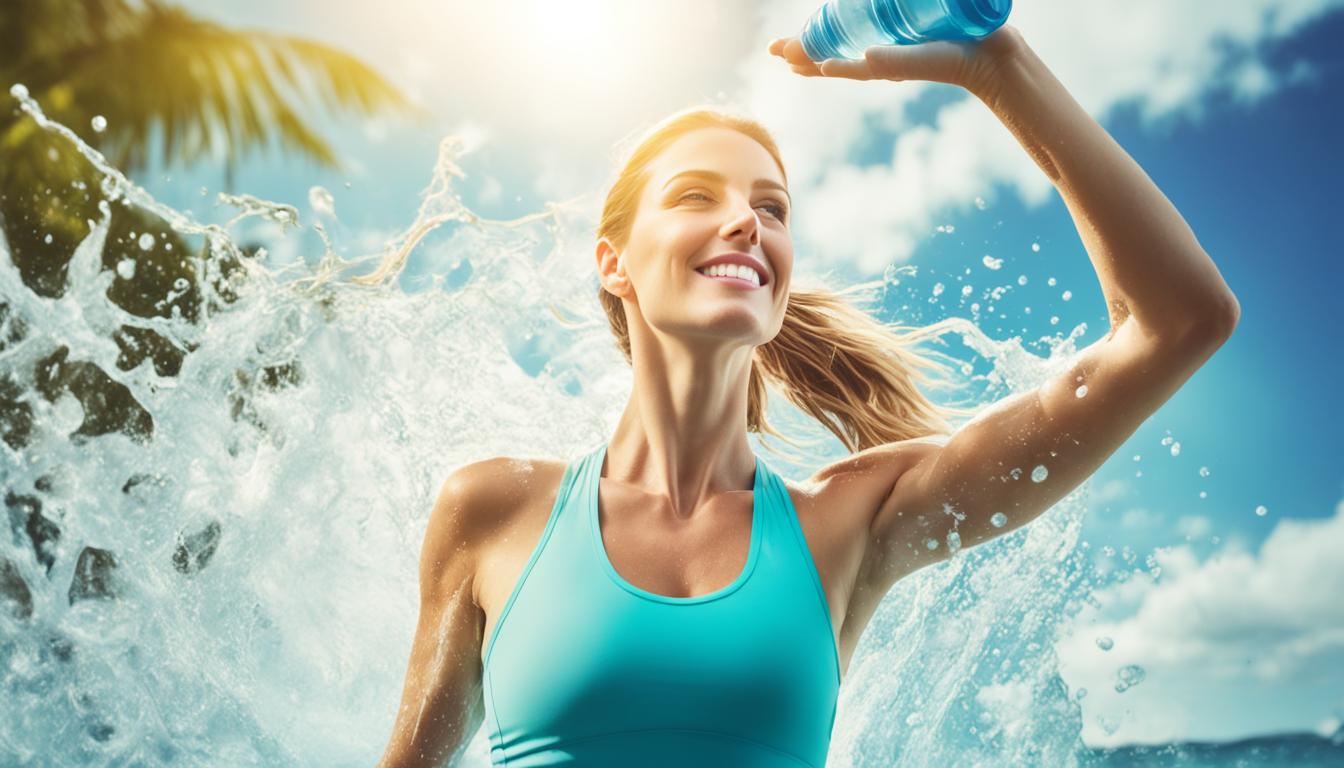Maintaining proper fluid intake is key for good health. The human body is about 60% water. This makes water crucial for many functions such as moving oxygen, regulating heat, and supporting kidney health.
Drinking water has many benefits. It helps digestion, removes toxins, and keeps your blood pressure steady. It can also aid in weight loss by making you feel full and speeding up your metabolism. This makes water important for any detox or healthy diet.
Keeping the body hydrated helps keep its acid-alkaline balance right. This is important for staying healthy. It also makes your skin look and feel better, as it keeps your skin moist and smooth from the inside.
The Essential Role of Water in the Human Body
Water is vital for making sure all body parts work well. It helps cells, organs, and your general health. Our bodies are mostly made up of water, around 60%. This shows how crucial it is for life.
Water helps with things like keeping the right body temperature and moving nutrients and oxygen around. It’s part of every human function. So, it’s really key.

Water in the body is super important. It helps with digestion, makes sure your joints work smoothly, and keeps your skin healthy. It’s vital for your heart, lungs, and brain to work right. Water also gets rid of bad stuff in your body to keep you healthy.
Water’s Crucial Functions in Bodily Processes
Water does a lot for our health. Some key things it does are:
- It helps keep our body temperature normal by sweating and breathing.
- Takes nutrients and oxygen to cells.
- Keeps our joints working and organs safe.
- Aids in digestion so we can use what we eat.
- Cleans out toxins and waste through urine and sweat.
- Keeps our body’s mineral levels in check.
The kidneys are especially important. They clean lots of fluid every day. If you don’t drink enough water, it can really harm your kidneys. This can lead to kidney issues and infections.
Dehydration and Its Effects on Health
Dehydration is when your body doesn’t have enough water. It messes up your health balance. Even a little bit of dehydration can cause tiredness, headaches, and not going to the bathroom enough. If it’s really bad, it can even be deadly.
| Dehydration Level | Symptoms | Potential Health Risks |
|---|---|---|
| Mild (1-3% body weight loss) | Thirst, dry mouth, fatigue, decreased urine output | Headaches, constipation, dizziness |
| Moderate (4-6% body weight loss) | Increased thirst, dry skin, rapid heartbeat, dark urine | Impaired cognitive function, muscle cramps, heat exhaustion |
| Severe (7% or more body weight loss) | Extreme thirst, sunken eyes, rapid breathing, confusion | Kidney failure, seizures, heat stroke, death |
Not having enough water for a long time messes with your body’s balance badly. It can cause seizures and make you pass out. In really serious cases, it can harm your kidneys and even cause death. This affects your blood and brain, your heart, and even how your immune system works.
To stay healthy and avoid dehydration’s dangers, drink enough water and other fluids every day. Learn to listen to when your body says it’s thirsty. And remember, your pee should be light yellow. When it’s dark, drink more. In hot weather or when you’re moving a lot, you need even more water.
Hydration for Optimal Physical Performance
Staying hydrated is key for athletes and anyone active. It helps maintain top performance and avoids dehydration’s bad effects. Proper fluids keep our body cool, help our muscles, and fight exercise tiredness. With good hydration habits, athletes can be at their best and reach their goals.
Impact of Dehydration on Athletic Performance
Not drinking enough water can hurt how well you perform, especially in tough workouts or hot places. Just a 2% drop in body water can lower how long you can go, your strength, and your power. Research shows not enough water can weaken muscles by about 2%, power by 3%, and endurance by 10%. This makes you tired faster, think less clearly, and risk getting sick from the heat.
| Level of Dehydration | Impact on Performance |
|---|---|
| 2% body weight loss | Impaired endurance exercise performance |
| Hypohydration | Muscle strength reduced by 5.5 ± 1.0% |
| Hypohydration | Anaerobic power reduced by -5.8 ± 2.3% |
Proper Hydration Strategies for Athletes
Athletes should find what works best for them when it comes to drinking. They need to know how much they sweat, how hard and long they exercise, and the conditions they’re in. Drinking the right amount of water and sports drinks is vital. Make sure drinks have the right mix of electrolytes and carbs. Always watch how you feel, what your pee looks like, and how much you weigh to stay on top of hydration.
- Consuming 6 to 12 ounces of fluid every 20 minutes during exercise
- Drinking 24 ounces of sports drink or electrolyte-infused water two hours before activity
- Aiming for 24 ounces of fluid per pound lost during exercise
- Choosing appropriate sports drinks with balanced electrolyte and carbohydrate content
- Monitoring hydration status through urine color, body weight changes, and thirst
Following these tips and staying hydrated helps athletes perform their best without dehydration’s challenges. It’s key to keep checking and adjusting how you hydrate to meet your body’s specific needs. This way, you can perform well in your sport and stay healthy.
Water Diet Health: How Hydration Supports Weight Management
Staying hydrated is key for good health and weight control. Water helps you feel full, eat fewer calories, and speeds up your metabolism. Adding water to your daily routine is a smart move for anyone trying to lose weight.

Water’s Role in Appetite Control and Metabolism
Drinking water before meals makes you less hungry. This means you might eat less – up to 75 calories less per meal, according to a study. Over time, this can really add up.
Water also burns a few extra calories as you digest it. These extra calories can help burn fat more slowly but steadily. Plus, keeping well-hydrated ensures your body runs efficiently, burning calories the right way.
A simple way to cut calories is to drink water instead of high-calorie drinks. Things like soda, juice, and sweet coffee can pack on the calories. Swapping them out for water helps manage your weight without a major diet change.
| Study | Key Findings |
|---|---|
| Hydration status and nutrition reviews (2005) | Discussed the hydration status of the population in the United States and Germany |
| Water intake by pregnant and lactating women (1991) | Estimated the intake of tap water and total water by pregnant and lactating women in the United States |
| Prevalence of plasma hypertonicity in older adults (NHANES III) | Highlighted the prevalence of plasma hypertonicity among older adults in a community setting |
For the best weight management effects, drink water all day long. Shoot for at least eight 8-ounce glasses a day to stay hydrated and feel less hungry. Keeping a water bottle handy and setting alerts can make this easier.
By making water a priority and knowing how it helps with hunger and calorie burning, you can boost your weight loss efforts. Adding this approach to your diet and exercise plan can help you see lasting changes and feel healthier overall.
Hydration’s Influence on Cognitive Function and Mental Well-being
Staying hydrated isn’t just for our bodies. It’s super important for our minds too. If we lose just a bit of water weight, around 1-3%, it can really mess with our mood, memory, and how well our brain works. Those are the findings from a 2005 study by Manz F and Wentz A. They looked at folks in both the U.S. and Germany. It showed many people in these countries don’t drink enough water.
Dehydration’s Effects on Mood, Memory, and Concentration
Feeling anxious or tired? It could be because you’re not drinking enough water. Studies have linked being dehydrated with these issues. For example, the NHANES III study in 2005, led by Stookey JD, found that many older folks might not drink as much water as they should. This makes them more likely to be dehydrated. Another study in 2005, with Bar-David Y, Urkin J, and Kozminsky E, focused on kids. It found that not having enough water could hurt their brainpower. It shows that water helps us think clearly at any age.
Staying Hydrated for Optimal Brain Function
If you want your brain to work well, drink enough water. This is true especially for those in hot places. A 1998 study with schoolkids in hot climates, by Bar-David Y and others, made this clear. It showed that how much you pee could tell us if you’re dehydrated. Plus, adding more water to a child’s school day helped them think better. So, water is key for keeping your brain sharp, no matter your age.




